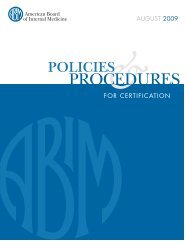The SRA Symposium - College of Medicine
The SRA Symposium - College of Medicine
The SRA Symposium - College of Medicine
You also want an ePaper? Increase the reach of your titles
YUMPU automatically turns print PDFs into web optimized ePapers that Google loves.
Papers<br />
Focusing on “Development”:<br />
Strategies for Strengthening Research at the University <strong>of</strong> Botswana<br />
Jose Jackson, PhD<br />
Office <strong>of</strong> Research and Development<br />
University <strong>of</strong> Botswana<br />
P.O. Box UB 00708<br />
Gaborone, Botswana<br />
Tel: 267-355-2903<br />
Email: maletej@mopipi.ub.bw<br />
Abstract<br />
Successful researchers globally have reported that their scholarly achievements have been due in<br />
part to acquiring effective habits <strong>of</strong> research and proposal writing early in their career. This they<br />
claim stimulated greater engagement in research with the outcome being high quality outputs. A<br />
survey was conducted at the University <strong>of</strong> Botswana (UB) between January - May 2005 to assess<br />
the constraints and incentives faced by academic staff to engage in research and seek funding for<br />
their programs. <strong>The</strong> findings indicated that personal commitment to research, career goals, presenting<br />
research findings, likelihood <strong>of</strong> attracting additional funds and the benefits <strong>of</strong> research to<br />
one’s teaching were leading incentives for academic staff in their pursuit <strong>of</strong> scholarship. <strong>The</strong> major<br />
barriers included workload issues, inadequate research budgets, lack <strong>of</strong> mentoring and collaboration,<br />
excessive requirements to develop proposals and limited time to write proposals. <strong>The</strong>se issues<br />
clearly pose significant challenges for academics, particularly junior researchers with limited experience<br />
and who make up about 70% <strong>of</strong> the total academic staff on the UB campus. <strong>The</strong> strategic<br />
approach being implemented by the Office <strong>of</strong> Research and Development (ORD), which focuses<br />
on the development <strong>of</strong> UB academic staff, particular junior researchers, will be reported.<br />
Introduction<br />
<strong>The</strong> University <strong>of</strong> Botswana is a relatively young university, established in 1982 with a focus on<br />
undergraduate education. Since then, UB has grown considerably; becoming more research focused<br />
and in 1996/97 began <strong>of</strong>fering research degrees (MPhil and PhD) in Chemistry, Biological<br />
Sciences and Mathematics. <strong>The</strong> 5-year University development plan, which ended in 2003 sought<br />
to increase research capacity across all disciplines, improve the quality <strong>of</strong> research conducted<br />
by academic staff, improve research training for undergraduate students, increase and improve<br />
research training for staff, increase efficiencies for research administration and extend researchbased<br />
knowledge for the benefit <strong>of</strong> the community and the nation (GOB, 1998).<br />
<strong>The</strong> University’s commitment to research was evidenced in 2001 by the establishment <strong>of</strong> the Office<br />
for Research Development (ORD) that reported directly to the Deputy Vice Chancellor for Academic<br />
Affairs. Until 1999, research was managed by the then National Institute for Development<br />
Research and Documentation (NIR), which was disbanded following a strategic planning exercise.<br />
This change has resulted in a re-emphasis on strategic management <strong>of</strong> research at UB. <strong>The</strong> current<br />
structure includes a Director with staff portfolios including Deputy Director, Assistant Director<br />
Research Quality Management, Assistant Director Research Funding and Assistant Director<br />
Commercialisation and Intellectual Property (vacant to be advertised) as well as 5 administrative<br />
<strong>of</strong>ficers with the responsibility to support and guide research at UB.<br />
Shaping the Future, which describes UB’s strategic and development plan from 2003 – 2008 and<br />
beyond, envisages the University as becoming a centre <strong>of</strong> excellence in Africa and the world (UB,<br />
2003a). From the recently filled positions <strong>of</strong> Assistant Directors and the ORD’s own strategic<br />
planning exercises, it is evident that repositioning research to a higher level is a priority at UB.<br />
132 2005 <strong>Symposium</strong> Proceedings Book

















